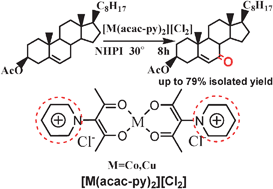Acetylacetone–metal catalyst modified by pyridinium salt group applied to the NHPI-catalyzed oxidation of cholesteryl acetate
Abstract

* Corresponding authors
a
Department of Chemistry, Zhejiang University, Hangzhou, P.R. China
E-mail:
lihr@zju.edu.cn
Fax: +86-571-8795-1895
b State Key Laboratory of Chemical Engineering, Department of Chemical and Biological Engineering, Zhejiang University, Hangzhou, P.R. China

 Please wait while we load your content...
Something went wrong. Try again?
Please wait while we load your content...
Something went wrong. Try again?
P. Zhang, C. Wang, Z. Chen and H. Li, Catal. Sci. Technol., 2011, 1, 1133 DOI: 10.1039/C1CY00186H
To request permission to reproduce material from this article, please go to the Copyright Clearance Center request page.
If you are an author contributing to an RSC publication, you do not need to request permission provided correct acknowledgement is given.
If you are the author of this article, you do not need to request permission to reproduce figures and diagrams provided correct acknowledgement is given. If you want to reproduce the whole article in a third-party publication (excluding your thesis/dissertation for which permission is not required) please go to the Copyright Clearance Center request page.
Read more about how to correctly acknowledge RSC content.
 Fetching data from CrossRef.
Fetching data from CrossRef.
This may take some time to load.
Loading related content
